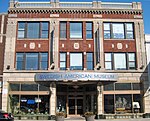Man's Country (bathhouse)
1972 establishments in New York City1973 establishments in Illinois1973 in LGBT history2017 disestablishments in IllinoisGay bathhouses in New York City ... and 6 more
Gay bathhouses in the United StatesHistory of gay men in the United StatesLGBT culture in ChicagoLGBT history in IllinoisLGBT history in New York CityLGBT studies
Man's Country was a chain of bathhouses and private clubs for gay men in Chicago and New York City. Man's Country/Chicago opened at 5015–5017 North Clark Street in Chicago on September 19, 1973 and held the title of Chicago's longest-running gay bathhouse when it closed in 2017.Less is known about Man's Country/New York, located at 28 West 15th Street (originally 53-55 Pierrepont Street), which closed in 1983.
Excerpt from the Wikipedia article Man's Country (bathhouse) (License: CC BY-SA 3.0, Authors).Man's Country (bathhouse)
North Clark Street, Chicago
Geographical coordinates (GPS) Address Nearby Places Show on map
Geographical coordinates (GPS)
| Latitude | Longitude |
|---|---|
| N 41.973 ° | E -87.6678 ° |
Address
North Clark Street 5015-5017
60640 Chicago
Illinois, United States
Open on Google Maps





